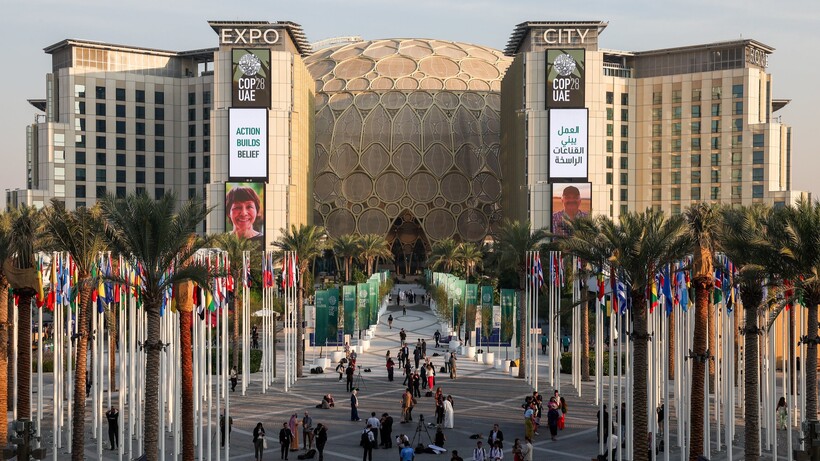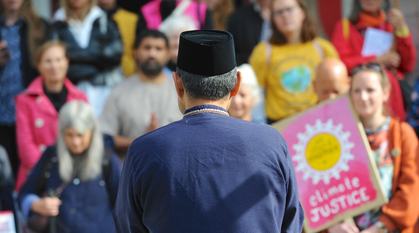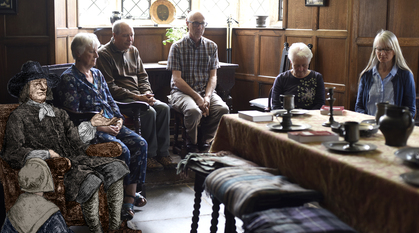The contradictions at the heart of COP28
The UN climate talks, COP28, recently took place in Dubai. Anna Aguto from the Quaker United Nations Office reports back on the challenges of moving forward global action on the climate crisis.

In the final plenary of the 28th Conference of Parties, after COP28 President Sultan Al-Jaber gavelled the decision text for the first Global Stocktake of climate action, Diego Pacheco, representing Bolivia, succinctly stated the contradictory stances of developed countries.
He described their championing of maintaining 1.5°C while simultaneously expanding fossil fuel production, their talk of human rights while the UN warns of genocide in Palestine, their emphasis on the need for more climate finance while financing industries destroying the planet. These words spoke to me as they reflected not only the contradictory narratives of Global North countries but also the contradictions that arose during my time at the COP.
I arrived in Dubai from Geneva, where I have been working as a Programme Assistant at the Quaker United Nations Office (QUNO). Despite growing up the daughter of a climate advocate, engaging in climate activism since I was a child, and studying environmental studies through my education, the day-to-day at a COP was still a mystery.
Locating the science
From the moment I stepped on the metro with my COP-issued free pass to arriving at the venue, Expo2020, I witnessed the well-oiled machine of Dubai. Inside the venue, I pieced together the ongoings of the COP. From events to press conferences to protests, I realised how easy it could be to forget about the ongoing negotiations.
This was aided by the massive and complex layout of the venue. There were official side event rooms and pavilions, which ranged from countries to organisations to themes. They either had an entire room or stood as one of the many stands in a bustling conference centre. With 40kg of QUNO publications that communicate the latest climate science in hand, Lindsey Fielder-Cook, the QUNO Representative on the Human Impacts of Climate Change, and I navigated this maze to find the Intergovernmental Panel on Climate Change (IPCC) pavilion.
In this search, we faced a striking contradiction. The physical presence of the IPCC was hidden under its parent organisation, the World Meteorological Organisation – a 15-minute walk from negotiation rooms. And yet, negotiators throughout the COP placed an acute emphasis on the science, especially the most recent findings of the IPCC. In fact, Al-Jaber repeatedly called keeping 1.5°C within reach his North Star.
The engagement of participants
In the negotiation rooms, I experienced another series of contradictions. QUNO attends COP for the negotiations and opportunities to engage with negotiators through quiet diplomacy, which Lindsey has been leading at the UNFCCC for ten years. This work is intense and engaging as we track negotiation language, especially around human rights, equity, urgency, and grounding in science.
Remarkably, towards the second week, I noticed a drastic drop in attendees. As events in week two also dwindled, I realised that for many COP attendees, with their obligations of a side or pavilion event fulfilled, COP was over. This reality was quite striking.
Taking stock
Towards the end of the COP, the Presidency released the draft decision of the Global Stocktake (GST), the first periodic review of countries' progress in reducing greenhouse gas emissions since the Paris Agreement in 2015. The reaction was an outcry from both negotiators and civil society organisations, quickly placing the blame on Saudi negotiators for removing language on a 'phase-out' of fossil fuels.
However, as the ECO newsletter had noted earlier in the week, five developed countries (US, Canada, Australia, Norway, and the UK) are still on track to be responsible for 51% of the new oil and gas production in the world by 2050. The disparity between the words and actions of developed countries is clear.
I am still encouraged by the outcomes of the COP: the commitment of civil society colleagues and activists who continue to hold countries accountable, the explicit naming of fossil fuels in UNFCCC decision text, the establishment of a fund for loss and damage, and increased conversations on the risks of technological fixes to climate change such as solar radiation management and carbon capture storage. I am encouraged by the intense advocacy efforts of QUNO, bringing much-needed conversations about money and power and military emissions through our side events and grounding our work in the moral and spiritual call of the climate crisis through our press conferences.
As I ate lunch with my aunt, one of the 150,000 members of the Lebanese diaspora living in the UAE, I was brought back to a sobering reality. She told me about the vegetables that the UAE could grow in country. How?, I asked, given its dry climate. She replied that the UAE could make it artificially rain. Rain in the desert, yet another contradiction.
Find out more about QUNO's work on the human impacts of climate change


